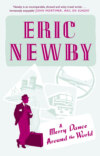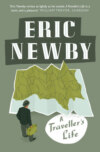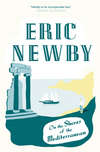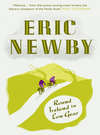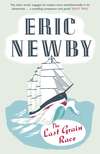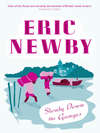Loe raamatut: «A Merry Dance Around the World With Eric Newby»

A MERRY DANCE
AROUND THE WORLD

THE BEST OF
Eric Newby

Contents
Cover
Title Page
First Steps
In and Out of Advertising
Around the World in a Four-masted Barque
A Short History of the Second World War
Rag Trade
Birth of an Explorer
Ganga Ma: Mother Ganges
Around the Mediterranean
On and Off the Trans-Siberian Railway
A Long Bike Ride in Ireland
At the Foot of the Apuan Alps
Plates
Index
About the Author
Also by the Author
Copyright
About the Publisher
First Steps
BIRTH OF A TRAVELLER
Births, Marriages, Deaths NEWBY. – On the 6th December at 3 Castelnau Mansions, Barnes, SW13, to Hilda Newby, wife of Geo. A. Newby – a son.
IN THIS EXTRAVAGANT fashion – altogether it cost 50p ($1.95)*, at a time when Lady Secretaries with shorthand and typing were earning around £3.50 ($13.65) a week – my arrival was announced on the following Tuesday, 9 December, in The Times and the Daily Telegraph, two of the daily newspapers my father ‘took in’ at that period. The other was the Daily Mirror, then a rather genteel paper, which he ordered for my mother, but never looked at himself, and which she passed on to the cook/housekeeper when she had finished with it. From then on it was also passed on to a nurse.
At 3.45 a.m., the ghastly hour I chose, or rather the doctor chose, for my arrival – I had to be hauled out by the head – conditions must have been pretty beastly in Barnes. It was a dark and stormy night, with a fresh wind from the west whose gusts would have been strong enough to blow clouds of spray from the big reservoir (which was opposite our flat by the bridge and which has now been filled in to make playing fields for St Paul’s School) over the pavement and right across the main road (which was called Castelnau but which all the inhabitants knew and know to this day as Castlenore) as it always did when the wind was strong from that particular quarter, sometimes, but rarely at 3.45 a. m. wetting unwary pedestrians and people travelling in open motor cars.
And it was certainly dark, although the moon had been up for more than thirteen hours and was only a day off full. It would be nice, more romantic, altogether more appropriate for a potential traveller, to think of myself arriving astride the Centaur, and, Sagittarius being in the ascendant, perhaps carrying the latter’s arrows for him, as we moved across a firmament in which ragged clouds were racing across the path of a huge and brilliant moon; but it was not to be. It was ordained that I should be a child not only of darkness but of utter darkness, of ten-tenths cloud.
When it dawned, the day was even more rumbustious than the night. And when the sun rose, just before eight o’clock, like the moon, it remained invisible. Thunderstorms visited many parts of the country, accompanied by hail, sleet or snow and west or north-westerly winds which reached gale force in high places. In Lincolnshire, the Belvoir Hunt, having ‘chopped a fox’ in Foston Spinney (seized it before it fairly got away from cover), ‘were hunting another from Allington when scent was totally swept away by a tremendous rainstorm’.
‘Flying Prospects’ on my birthday were not good, according to The Times. It is now difficult to imagine that a pilot, or even a passenger, might actually buy a newspaper in order to find out whether it was safe to ‘go up’, but it must have been so, otherwise there would have been no point in publishing the information at all. ‘Unsuitable for aviation or fit only for short distance flying by the heaviest sort of machine’ was what the communiqué said. ‘Sea Passages’ were equally disagreeable. The English Channel was rough, with winds reaching forty miles an hour, and there was extensive flooding in France.
But if the weather was disturbed that Saturday, it was as nothing compared with the state of great chunks of Europe and northern Asia. In spite of the fact that the advertising department of The Times had chosen this particular Saturday to announce ‘PRESENTS SUGGESTIONS FOR THE GREAT PEACE CHRISTMAS’, on it Latvians were fighting Germans, on whom they had declared war a week previously on 28 November, and so were the Lithuanians. In Russia, on the Don and between Voronezh and Kirsk and in Asia, beyond the Urals, along the line of the Trans-Siberian Railway, where typhus was raging, Bolsheviks and White Russians were engaged in a civil war of the utmost ferocity. Meanwhile, that same Saturday, while their fellow countrymen were destroying one another, with their country in ruins and becoming every day more ruinous, Lenin and Trotsky and the 1109 delegates of the Seventh All-Russian Congress of Soviets passed a resolution to the effect that ‘The Soviet Union Desires to Live in Peace with All Peoples’. On that day, too, Lenin told the Congress that ‘Communistic Principles were being utterly disregarded by the Russian peasantry.’
That day, too, much nearer home, while I was taking my first nourishment, as it were, in the open air, French Army units with heavy guns were rumbling across the Rhine bridges in order to force the Germans to ratify the peace treaty which they had signed at Versailles in June; and in the same issue of The Times which carried the headline about ‘THE GREAT PEACE CHRISTMAS’, there were other headlines such as ‘GUNS ACROSS THE RHINE’ and ‘WAR IMMINENT’, although who was to fight another war with millions killed and wounded, armies in a state of semi-demobilization, and millions more dying or soon to die from sickness and starvation was not clear. Nevertheless, that weekend, the only thing, theoretically, that stood between the protagonists and another outbreak of war, was the Armistice, signed in a French railway carriage parked in a wood, thirteen months previously, so that, equally theoretically, it would simply have meant carrying on with the old one. That weekend, too, the Americans quitted the peace conference.
There was, altogether, a lot about death in the papers that Saturday. It was as if Death the Reaper, an entity embodied by cartoonists in their drawings as a hideous, skeletal figure, and it would have been difficult to have lived through the last five years without thinking of death as such, had become dissatisfied with his efforts, had once again sharpened his scythe and was already cutting fresh, preliminary swathes through the debilitated populations of the vanquished powers, as if the great influenza epidemic, which reached its peak in Britain in March 1919, and which altogether killed more people in Europe than all the shot and shell of four and a half years of war, had not been enough.
In Britain, that Saturday, things were rather different. Bank rate was six per cent, exports were booming. On Friday, the US dollar closed at $3.90 to the pound. The only disquieting news that morning, and that was more or less a rumour, was that there was a possibility of a number of pits being forced to close in the South Wales anthracite fields.
Altogether, for many people that Saturday, life seems to have gone on much as it had done before the Deluge. Giddy and Giddy, House Agents, offered a luxuriously furnished town house, facing Hyde Park, with thirteen bed and dressing-rooms for £26.25 ($102.40) a week. Harrods announced Laroche champagne, 1911, the last vintage generally available (shipped) since the war, at £6.50 ($25.35) a dozen. Very old vintage port (Tuke Holdsworth) was £4.50 ($17.55) a dozen. Not advertised in The Times or the Daily Telegraph, but still listed in Harrods’ enormous current catalogue, (and for some years to come) under ‘Livery’, were red plush breeches for footmen.
Domestic servants were still comparatively inexpensive, although more difficult to find, than they had been before the war. That Saturday Lady Baldwin, of 37 Cavendish Square, advertised for a housemaid, ‘five maids and a boy kept, wages £28-£30 ($109-$117) a year’. And there were vacancies for live-in under nurses, at £25 ($97.50) a year, the price of a high-class baby carriage of the sort that my mother had acquired for me.
That Saturday, too, wholesale garment manufacturers, at what was, and still is, known as ‘the better end of the trade’, the sort of firm my father was a partner in, were advertising jobs in their workrooms for bodice and skirt makers at around £2.50 ($9.75) for a five and a half day, forty-nine hour week (8.30 a.m. to 5.30 p.m. week-days, 8.30 a.m to 12.30 p.m. Saturdays), £130 ($507) a year, which made the 5op spent on announcing my birthday seem hideously extravagant.
That Saturday some London fashion houses, including the then ultra-fashionable Lucile, in Hanover Square, were advertising for ‘Model Girls’, in emulation of Paul Poiret, the Parisian designer, who had just returned from the army and for the first time showed clothes on living models.
A sketch in The Times that Saturday shows that clothes were good-looking, if not positively saucy. Dresses, according to their fashion correspondent, were ‘décolleté, sometimes dangerously low’, in brilliant colours, with tight, mid-calf-length skirts. Jet was high fashion for the evening: embroidered on coloured velvet, used for making girdles and shoulder straps. Feathers, which had been used for years for making headdresses for evening, were being replaced by flowers, ‘as little like nature as possible?’, although another couple of years were to pass before the Importation of Plumage (Prohibition) Act became law. The ultra-fashionable were already wearing the long, skimpy jerseys which were to become a sort of hallmark of the 1920s; but there was nothing about them in the papers the day I was born.
Yet in spite of all this display of what an American politician described as ‘normalcy’, ‘The Great War’, as it would still be referred to by the British far into the next one, although over, must have seemed terribly close to most people, as it still must do today to anyone reading some of the classified advertisements which appeared in the quality papers that Saturday. The request for a lady or gentleman to play once a week at a thé dansant in a hospital for shell-shocked officers. The offers to keep soldiers’ graves trimmed and lay headstones in the neighbourhood of Albert, Bapaume and Péronne – the dead had not yet been gathered together in communal cemeteries. The endless columns of advertisements inserted by ex-servicemen, under ‘Situations Wanted’ (there were 350,000 of them unemployed), part of the huge citizen army of the still living that was being demobilized into a world in which, in spite of there being whole generations of dead, there was not enough work for all. Such advertisements, inserted by ex-officers, warrant officers, petty officers, NCOs and men of superior education (the labouring classes did not advertise their services in this way), were some of them despairing, some of them pathetic, some of them hopeless:
EX-SERVICE MAN. Loss of right arm, seeks situation as Window Dresser or Shopwalker.
DEMOBILIZED OFFICER. Aged 21, 4½ years’ service [my italics]. Good education. Left school to join up, therefore no experience. Accept small salary until proficient.
Will anyone lend DEMOBILIZED OFFICER, DSO, just starting work again, £5000 ($19,500) for one year? Highest references. Applicant desperately pressed by money-lenders. No Agents. Write Box J.28.
Money-lenders were so numerous that they had whole classified sections to themselves. Most of them offered ‘immediate advances on note of hand alone’. Their advertisements make repulsive reading, even across such a gulf of years.
A far more prominent advertisement than any of these announced the setting up of what was called the Bemersyde Fund, opened by the Lord Mayor of London and the Right Honourable Lord Glenconner, ‘to acquire the estates of Bemersyde from its owner and have the same conveyed to Field-Marshal Earl Haig, a member of the well-known whisky distilling family, as a personal gift from the people of the British Empire – the consideration for the purchase being £53,700 ($209,430)’.
Altogether – leaving present for the headmaster (the Estates of Bemersyde), although he had not been a very good headmaster, the boys (or what was left of them, for it had been rather a rough school with a lot of mud in the playing fields) now going out into the world to seek their fortunes – there was a distinctly end-of-term feeling in the air. But in spite of this there was no singing of ‘Lord Dismiss Us With Thy Blessing’ as one would perhaps expect on such occasions and as there was at the schools I later attended. Possibly because the only songs the boys knew were not hymns but songs that had become dirges: ‘Pack Up Your Troubles’, ‘Tipperary’, ‘It’s a Long Long Trail A’Winding’ and ‘I Don’t Want To Join The Army’.
Even the Ministry of Munitions and the Admiralty were selling up. That day and every day there were offers for sale by auction of aerodromes, enormous munition factories, equally enormous hutted camps, and of minesweepers, motor charabancs, fleets of ambulances, ships’ boilers, railway engines, enough barbed wire to encircle the earth, millions of cigarettes in lots, miles and miles of ships’ hawser, inexhaustible supplies of bell tents, cereal ovens, lower fruit standard jam, wicker-covered stoneware jars, torpedo boats, with and without engines and part-worn and unworn issue clothing, etc., etc., etc., so inexhaustible that many items were still being sold off twenty years later on the eve of the next world war, when the whole stocking up process began all over again. Everything, except projectiles and the means of discharging them, was open to offer and even these would eventually come on the market, but for export only.
In fact the world was changing with a rapidity that would have been unbelievable in 1914, even though it was still possible to buy red plush breeches for footmen and under nurses could still be acquired with comparative ease. Yet it was, one sees in retrospect, only a temporary acceleration. If it had continued at the rate envisaged in 1919 man would probably have stood on the moon by 1939.
That afternoon the muffin man ringing his bell went down Riverview Gardens, the side road outside ‘Ther Mansions’ as the local tradesmen who dealt with my mother called them, in which there were other blocks of flats, carrying his muffins in a wooden tray covered with a green baize cloth, which he balanced on his head; and the lamplighter came and went on his bicycle (lighting-up time that evening was 4.21 p.m.), lancing the gas lamps in the street into flame with a long bamboo pole.
And so ended my birthday. For all concerned it had been a jolly long one.
The truth is that babies do not like travel, and I was no exception. Babies are unadventurous. Babies act as grapnels to prevent ‘the family’ dragging its ground. That is why they were invented. Perversely, their desire for fresh horizons comes much later when they have already begun to ‘attract’ fares, and can no longer travel free; by which time they are no longer babies at all.
I remember the Isle of Wight as the place where I first sat in the side-car of a motor cycle, at Easter 1923, but much more I remember it as being the Place Where God Lived, although this was later, some time in the summer or autumn of 1925. It must have been during one of those interpolated holidays my mother was so adept at arranging at an instant’s notice if my father had to go abroad without her, on the grounds that a change of air would do me good. He often used to go to Holland to sell enormous coats and costumes to the Dutch. With her she took her sister, my Auntie May, who loved travel, however banal.
On one occasion we made an excursion to a place near the middle of the island and some time in the afternoon of what I remember as a very hot day we arrived at our destination, a village of thatched houses that were clustered about the foot of a green hill, on the summit of which stood what seemed a very small church.* From where we stood it was silhouetted against the now declining sun, the rays of which shone through its windows, producing an unearthly effect.
There was no time to climb the hill to the church and have tea as well. If there had been, I am sure that my mother and my aunt, both of whom were interested in ‘old things’, would have done so. Instead, we had the tea, in the garden of one of the cottages, and while we were having it I heard my mother and my aunt talking about the place and how nice it was, which they called Godshill.
I was very excited. Godshill. If this was Godshill then God must live on it. God to me at this time and for long years to come was a very old, but very fit, version of Jesus and much less meek-looking. He had a long white beard, was dressed in a white sheet and was all shiny, as if he was on fire. He also had a seat in the front row of the dress circle, as it were, so that he could see immediately if one was doing wrong. This was the God to whom I prayed each night, either with my mother’s help or with whoever was looking after me.
‘Does he live on it?’ I asked my mother.
‘Yes,’ said my mother, ‘that’s where he lives, darling, on top of the hill.’
I was filled with an immense feeling of happiness that this radiant being, whom I had never actually seen but who was always either just around the corner or else hovering directly overhead but always invisible, should live in such a shining, beautiful place; and I asked if we could climb the hill and see him. Unfortunately, the train was due and we had to hurry to the station. I cried all the way to it and most of the way back to Bembridge. I never went back to Godshill and I never will.
I can remember, in July 1923, being carried high on my father’s head through the bracken in the combes that led down to the beaches on Sark, and once having reached them I can remember falling down constantly on the rocks and hurting myself, I considered, badly. And it was on Sark that I had my first remembered nightmare, in the annexe to Stock’s Hotel, a charming, ivy-clad, farmlike building. I awoke screaming in what was still broad daylight with the sun shining outside my first-floor room in which the blinds were drawn, to think myself abandoned to a dreadful fate by my parents who were dining only a few feet away in the hotel, certain that I had ‘gone off’ to sleep. It was a nightmare of peculiar horror, because it was founded on fact; so horrible and at the same time so difficult to explain to anyone that for years I dared not confide the details to anyone, and to my parents I never did, although it recurred throughout my childhood, together with an almost equally awful one about falling down an endless shaft.
WESTWARD HO!
In 1925, when I was five and a half, we embarked on what, so far as I was concerned, was the most ambitious holiday I had ever had. In summer my father took a cottage at Branscombe, at that time a very rural and comparatively unvisited village in South Devon, between Seaton and Sidmouth. It promised to be a particularly exciting time as my father had decided that we should travel there from Barnes by motor. This meant that most of our luggage had to be sent in advance by train from Waterloo to Honiton, a market town on the main line to Exeter; at Honiton it was picked up by a carrier and transported the ten miles or so to Branscombe by horse and cart. Others taking part in this holiday, although they did not travel with us, being already foregathered there, were my Auntie May (the aunt who had accompanied my mother and me on the memorable visit to Godshill) and her husband, Uncle Reg. Before the war Uncle Reg had worked as a journalist in Dover on the local paper and in this capacity had been present in 1909 when Blériot landed on the cliffs, having flown the Channel. During the war he had been in the navy in some department connected with propaganda. Later he became editor of the Gaumont British Film News. He was very urbane and elegant. He was later on good terms with the Prince of Wales for whom he used to arrange film shows at Fort Belvedere, and for the Royal Family at Balmoral. For these services he was presented with cufflinks and cigarette cases from Plantin, the court jeweller, as well as other mementoes. He preferred to be called Reginald rather than Reg, but no one ever did so. They put up in the village pub where we, too, were to take our meals.
The third party was made up of three fashion buyers for London stores, Beryl, Mercia and Mimi Bamford, all of whom were friends of my mother, particularly Mimi, and their mother. All three were unimaginably elegant, often almost identically dressed in long, clinging jerseys and strings of amber beads, and they were surrounded by what seemed to be hordes of extremely grumpy Pekingese who did not take kindly to the country. Their mother, who did not take kindly to the country either, was even more formidable. She owned a Boston Bulldog called Bogey, which had had its ears clipped, a practice by then declared illegal. Like her daughters she was immensely tall, and must at one time have been as personable as her daughters, but even I could recognize that she was incredibly tough, if not common.
‘She didn’t ought to ’ave ’ad ’im,’ was the comment she made about me, by now a boisterous, active little boy, to my Auntie May while we were at Branscombe, ‘she’ being my mother; an anecdote that my aunt eventually told me, which she did with an excellent imitation of the old lady’s gravelly voice, having put off doing so until only a few years before her own death in 1974 in order, as she put it, to spare my feelings.
Neither Beryl nor Mercia nor their mother ever went to the beach, or even set eyes on the sea, the whole time they were at Branscombe. For Beryl and Mercia the seaside was Deauville. What Branscombe was to them is difficult to imagine, or they to the inhabitants. Only Mimi relished the simple life. The journey to Branscombe, a stately progression, took two days.
At Branscombe, behind the Mason’s Arms, the pub which stood next door to the cottage my father had taken for the summer and of which it formed a part, there was a yard surrounded by various dilapidated outbuildings and a piece of ground overgrown with grass and nettles which concealed various interesting pieces of rusted, outmoded machinery, the most important of which was an old motor car smelling of decaying rubber and dirty engine oil. The stuffing of what was left of its buttoned leather upholstery was a home for a large family of mice. This yard was to be the scene of some of the more memorable games I played with my best friend in the village, Peter Hutchings, whose mother kept a grocery, confectionery and hardware shop on the corner opposite Mr Hayman, the butcher’s. It was from Peter Hutchings, who was killed while serving as a soldier in the Second World War, and whose name is inscribed with the names of fourteen other village boys who died in the two great wars on the war memorial at the entrance to Branscombe churchyard, that I learned the broad local dialect which was so broad that by the end of that first summer at Branscombe no one except a local inhabitant could understand what I was saying. ‘Sweatin’ like a bull ’er be,’ was how Peter Hutchings described to me one day the state of his sister, Betty, confined to bed with a temperature, and it was in this form that I passed on this important piece of news to my parents.
There in the inn yard, in the long summer evenings, we used to sit in the old motor car, either myself or Peter at the wheel, taking it in turn, the driver making BRRR-ing noises, the one sitting next to him in the front making honking noises – the horn had long since ceased to be – as we roared round imaginary corners, narrowly missing imaginary vehicles coming in the opposite direction, driving through an imaginary world to an imaginary destination on an imaginary road, a pair of armchair travellers. In the back we used to put Betty Hutchings, if she was available, who wore a white beret, was placid, said nothing, apart from an occasional BRR, and was in fact an ideal back-seat passenger. Sometimes, if we felt like doing something ‘rude’, we used to stop the car and pee on the seats in the back, and Betty would pee too. This gave us a sense of power, at least I know it did to me, as I would not have dared to pee on the upholstery of a real motor car belonging to real people. Less courageous than my wife, who confessed to having peed on the back seat of a ‘real’ very expensive motor car stopped outside her parents’ house at her birthplace in the Carso, and smeared it with cow dung.
When we got tired of driving our car we ourselves used to become motor cars, tearing up and down the street outside making BRRR-ing noises of varying intensity as we changed gear, disturbing the elderly ladies who used to sit at their cottage doors making Honiton lace, pillow lace, appliqué and guipure, the principal manufacture of the village. Close by, over the hill at Beer where there were stone quarries, the quarry men’s wives had made the lace for Queen Victoria’s wedding dress in 1839, something that was still talked about in the neighbourhood more or less as if it had happened yesterday. It was these hideous BRRR-ing noises that no doubt prompted old Mrs Bamford, whose cottage also faced the main street, to utter the words, ‘She didn’t ought to ’ave ’ad ’im.’
But all this was in the future, that first day of our holiday.
The next morning I woke at what must have been an early hour and, obeying some mysterious summons, dressed myself in the clothes that I had worn the previous afternoon – white shirt, shorts, socks and white sun hat (I couldn’t manage the tie unaided), brown lace-up shoes from Daniel Neal’s in Kensington High Street (soon to be replaced by hobnail boots, bought for me at my earnest request so that I could be a real country boy, which took me ages to tie) and my pride and joy, a hideous red and green striped blazer with brass buttons that I had persuaded my mother to buy for me, much against her will, from Messrs Charles Baker, Outfitters, of King Street, Hammersmith, so that I should look more like what I described as ‘a real schoolboy’ rather than an infant member of the kindergarten at the Froebel School in Barons Court. As school blazers were not made to fit persons as small as I was, when I was wearing it my short trousers were scarcely visible at all. Not even Messrs Baker appeared to know which school it was, if any, that had red and virulent green stripes as its colours. Then, having picked up a stout stick that I had acquired the previous day, I stole downstairs and let myself out into the village street which was deserted as it was Sunday morning.
At the side of the road, opposite what I was soon to know as Mrs Hutchings’s shop, a little stream purled down from one of the side valleys, one of several such streams that, united, reach the sea at Branscombe Mouth; and there, under a brick arch, it issued from a pipe which supplied this lower end of the village with water, before burrowing under the road to reappear once more outside the shop. From here it ran away downhill over stones along the edge of a little lane with an old, ivy-clad wall on one side of it, chattering merrily to itself as it ran over the stones in a way that seemed almost human.
Here, in this narrow lane, the water had what looked to me like watercress growing in it, and it was so clear and delicious-looking that I got down and had a drink of it, only to find that it was not delicious at all and that it had a nasty smell. Later I discovered that Betty Hutchings used to drink from this crystal stream if she was not watched which was probably the reason why she sweated like a bull.
I continued to follow the stream, racing twigs down it, until it vanished into a sort of tunnel from which proceeded a delightful roaring sound. At the other end it emerged beyond a wicket gate to flow more placidly under a little bridge and in these calmer waters I spent some time stirring up the bottom with my stick and frightening some water beetles, the air about me filled with the droning of innumerable insects.
From this point it ran to join the main stream in the middle of the valley and here the path turned away from it to the left beyond a five-barred gate which, because I could not open it unaided, I squeezed underneath, to find myself in a beautiful and what seemed to me immense green meadow, hemmed in by hedgerows and huge trees and filled with buttercups, while high above it to the right were the hanging woods we had seen the previous morning from the car, the open down above them alive with gorse.
At the far end of this field the now augmented stream was spanned by a small wooden footbridge with a white painted handrail. When I eventually reached the stream, in spite of all these distractions and making a number of more or less unsuccessful attempts to spear on the end of my stick some of the older, harder sorts of cow flop in which the field abounded, and launch them into the air, the water tasted even funnier than it had done in the village outside Mrs Hutchings’s shop and I stung myself on the nettles getting down to it.
